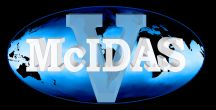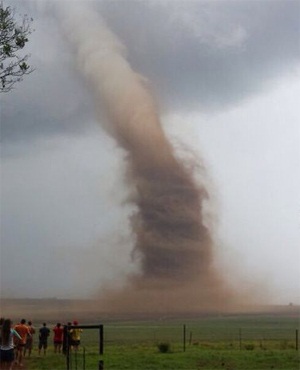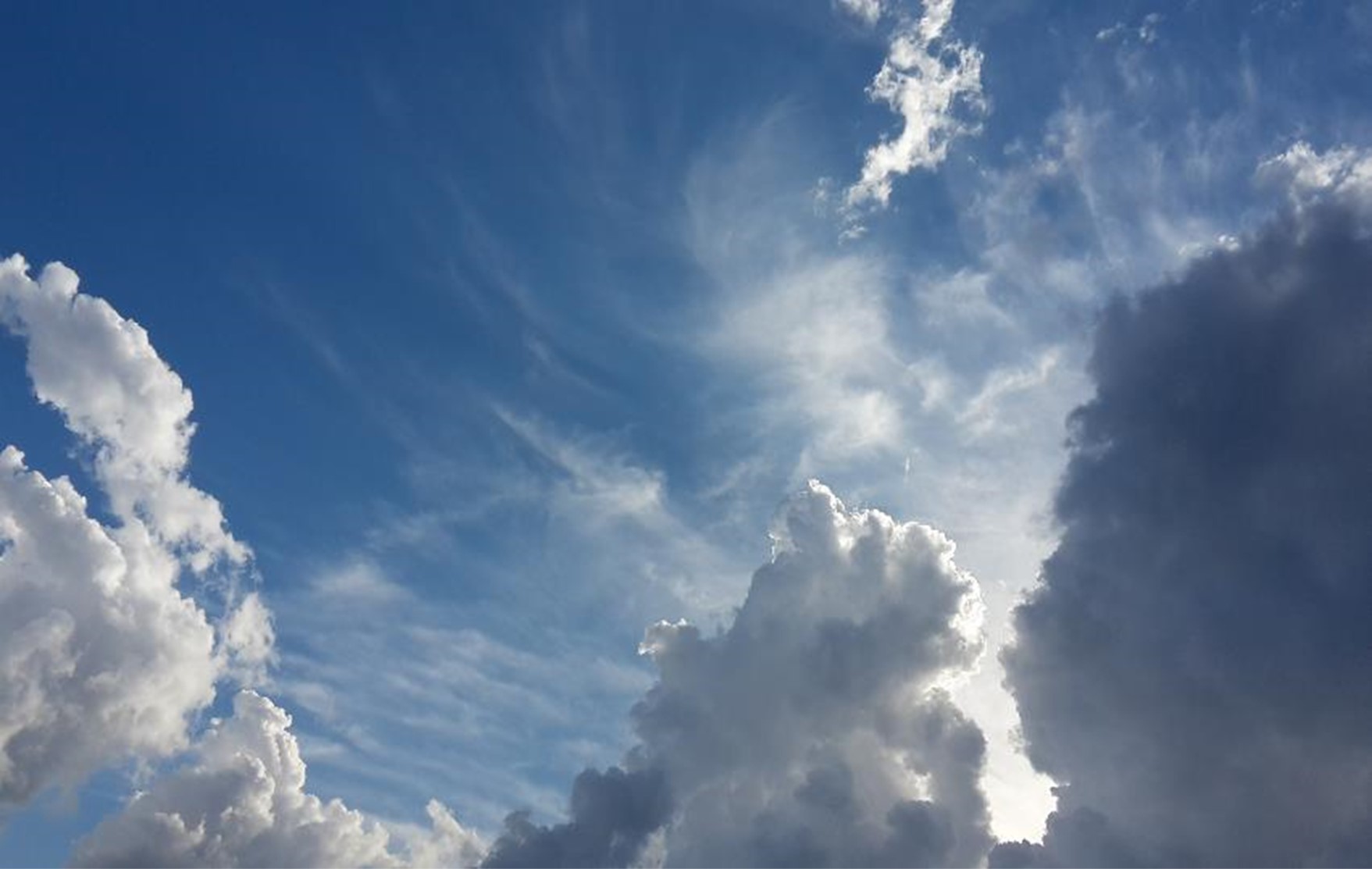- Teacher: Roelof Bruintjes
- Teacher: Roelof burger
- Teacher: Diederik Enslin
- Teacher: Tshidi Mogale
- Teacher: Cynthia Nemutudi
- Teacher: Jannie Stander
Available courses

- Teacher: Petro Burger
- Teacher: Charlotte Mcbride
- Teacher: Lithakazi Mkatshwa
This course focuses on the application and interpretation of severe weather alerts released by the South African Weather Service to Disaster Management structures
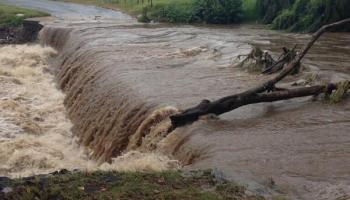
- Teacher: Vanetia Phakula
- Teacher: Kevin Rae
- Teacher: Lee-ann Simpson
- Teacher: Jannie Stander
- Teacher: Dipuo Tawana
- Teacher: Hugh van Niekerk
- Teacher: Winifred Jordaan
- Teacher: Gugu Maphisa
- Teacher: Lithakazi Mkatshwa
- Teacher: Colleen Rae
- Teacher: Teke Ramotubei
- Teacher: Lee-ann Simpson
- Teacher: Jannie Stander
This is a course where the basic aspects of weather are presented. modules will briefly deal with the most popular questions asked about the weather and weather forecasting.

- Teacher: Winifred Jordaan
- Teacher: Lithakazi Mkatshwa
- Teacher: Colleen Rae
- Teacher: Teke Ramotubei
- Teacher: Lee-ann Simpson
- Teacher: Jannie Stander
The 1-Day Basic Meteorological Understanding course is designed to facilitate an understanding of some basic meteorological concepts for persons without a background in meteorology. It serves as background for understanding atmospheric processes and as well as the interpretation of weather systems in the Southern Hemisphere, and is regularly presented to new members of staff and key stakeholders. Primarily, the course seeks to;
- Promote a basic level of meteorological and climatological understanding
- Promote an understanding of the different types of weather instruments and various weather data collection tools, as well as to
- Improve the interpretation of SAWS products
The course included presentations on the following areas of focus;
- The structure and composition of the atmosphere
- The characteristics of surface and upper air circulation
- The classification of different cloud types and precipitation associated with them
- Understand how the meteorological data information is collected, and how it is used in the compilation of a weather forecast, and
- Interpretation of the weather forecast issued by the Weather Service.
- Teacher: Gugu Maphisa
- Teacher: Lithakazi Mkatshwa
- Teacher: Teke Ramotubei
The WMO review of the BIP-MT course
- Team member: Moira Doyle
- Team member: Diakaria Kone
- Team member: John Peters
- Team member: Colleen Rae
- Team member: Anna Timofeeva
CoComm 2018
- Teacher: Andrea Henderson
- Teacher: Winifred Jordaan
- Teacher: Jennifer Milton
- Teacher: John Ogren
- Teacher: Pablo Ortiz
- Teacher: Liz Page
- Teacher: Patrick Parrish
- Teacher: Didier Reboux
- Teacher: Duncan Tippins
- Teacher: Sally Wolkowski
Satellite image interpretation and the basics of satellite meteorology
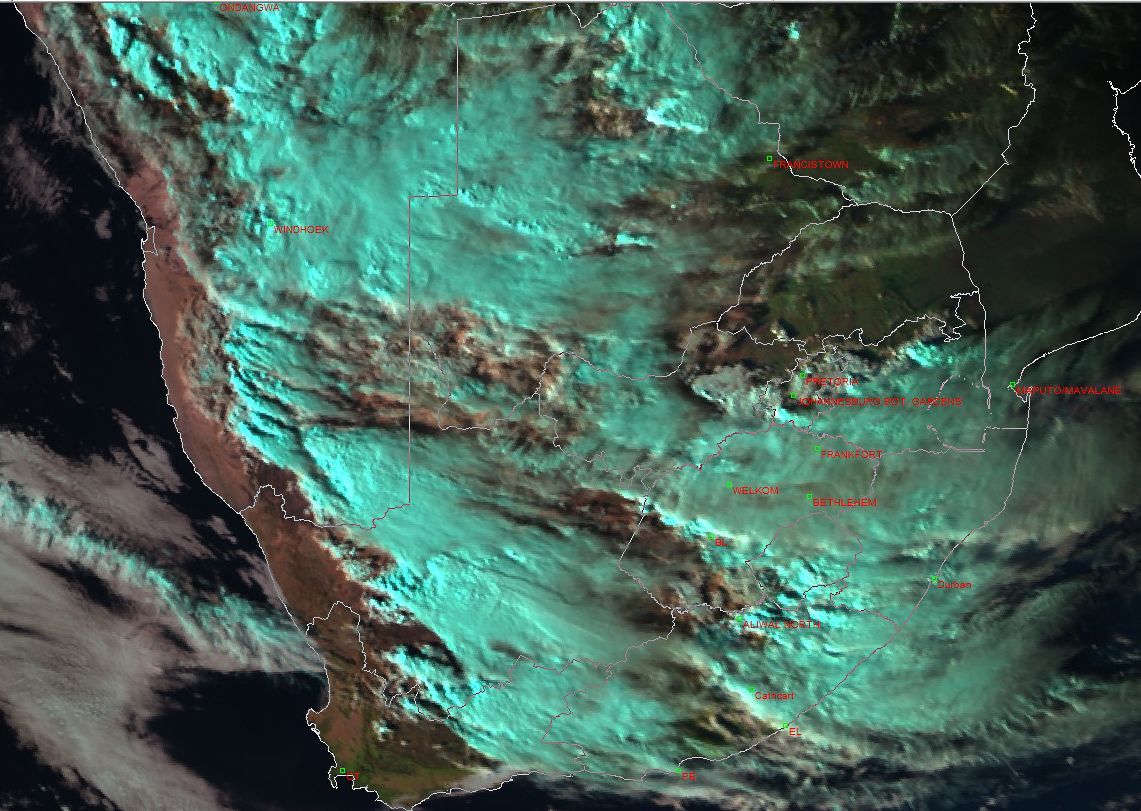
- Teacher: Lee-ann Simpson
- Teacher: Jannie Stander
- Teacher: Gugu Maphisa
- Teacher: Bongiwe Mtongana
This is a "pre-course" online interface, where you can test your skills on the basics of MSG image interpretation. There will be data resources for you to work though, as well as quizzes which you will need to complete in order to be eligible to be formally invited to attend the workshop in Pretoria, South Africa in March 2015.
- Teacher: Jochen Kerkmann
- Teacher: Maja Kuna
- Teacher: Lee-ann Simpson
- Teacher: Ivan Smiljanic
- Teacher: Jannie Stander
- Teacher: Izabela Zablocka
The Eumetsat Satellite workshop aims to cover basic satellite image interpretation as well as to introduce new techniques in visualizing and manipulating satellite data. This years' course will be more practical and "hands on". the Online phase will run from the 13th October until the 19th November. The workshop itself will be hosted in Pretoria, South Africa, from the 1st to the 5th December 2014.
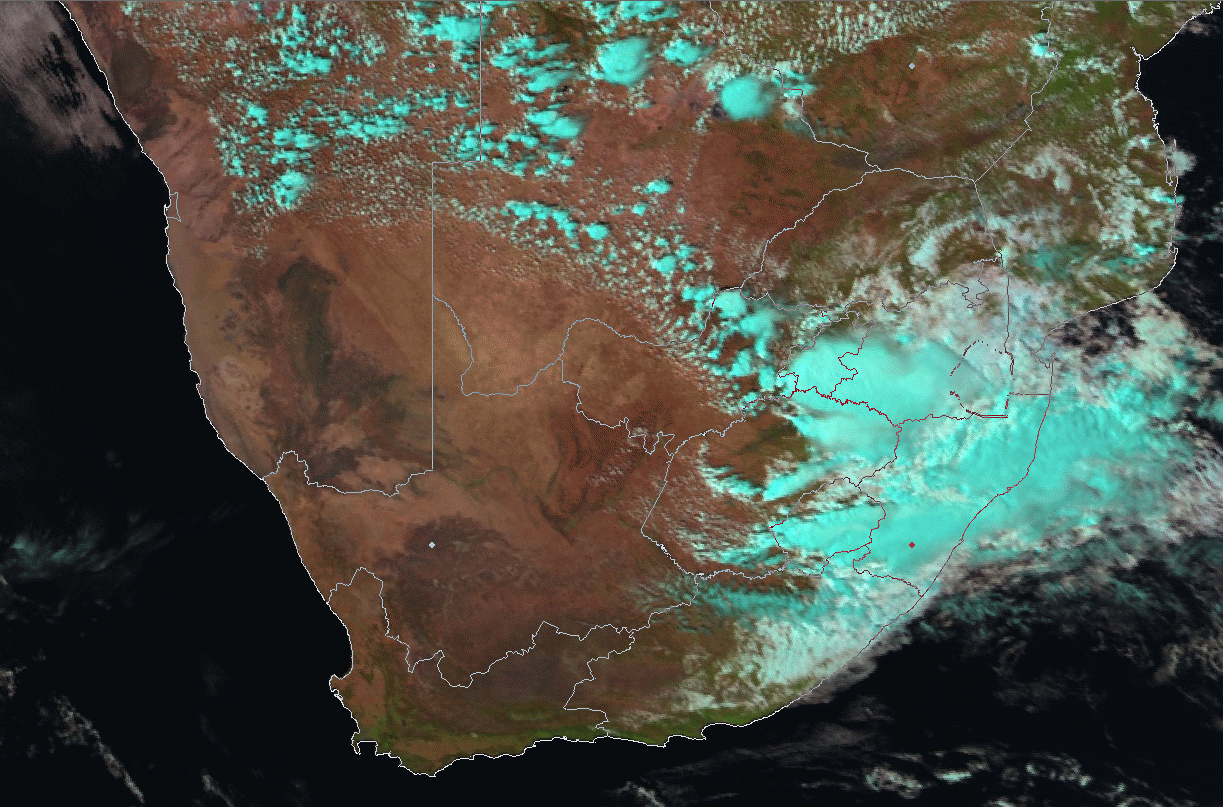
- Teacher: Lee-ann Simpson
- Teacher: Jannie Stander
This is the online phase For the upcoming satellite workshop to be hosted in Pretoria in March 2016.
- Teacher: Bruce Muller
- Teacher: Madalina Ungur
- Teacher: Marianne Weingroff
An Introductory course on Coastal Meteorology aimed at those that seek to understand the characteristic nature of the coastal environment and its weather. In order to bring about the optimal and harmonious use of this resource by the vast cross-section of users, there needs to be a sound understanding of it, and the basic meteorological and oceanographic processes that take place within it.
The course will assist the participants in understanding;
- circulation within the coastal ocean,
- coastal atmospheric circulation (including the marine atmospheric boundary layer), as well as
- ocean-atmosphere interaction processes.
It is hoped that at the end of this course, participants will have attained an enhanced knowledge & understanding of the coastal zone to support strategy and decision-making. More specifically, participants are expected to gave gained:
- An enhanced knowledge of meteorological processes specific to the coastal zone,
- Improved understanding of the impact of meteorological events on the coastal zone
- Teacher: Lithakazi Mkatshwa
- Teacher: Vanetia Phakula
- Teacher: Lithakazi Mkatshwa
- Teacher: Lee-ann Simpson
- Teacher: Jannie Stander
- Teacher: Elizabeth Webster
A platform created for the WMO RA1 Marine Forecaster interaction and capacity building
- Teacher: Mark Higgins
- Teacher: Winifred Jordaan
- Teacher: Christina Liesker
- Teacher: Lithakazi Mkatshwa
- Teacher: Sergio Muacho
- Teacher: Vanetia Phakula
- Teacher: Colleen Rae
- Teacher: Lee-ann Simpson
- Teacher: Jannie Stander
- Teacher: Madalina Ungur
- Teacher: Sally Wannop
- Teacher: Elizabeth Webster
This forms part of the marine post interview
- Teacher: Jannie Stander
- Teacher: Lee-ann Simpson
- Teacher: Hugh van Niekerk
This is a resource site where Meteorological Case studies can be uploaded from any operational personnel. The archive will be accessible to all interested and involved parties and can be updated with interesting weather related cases. Resource material can include (but is not limited to) satellite imagery, NWP output, RADAR imagery, Lightning detection information, photographs and real time observational data.
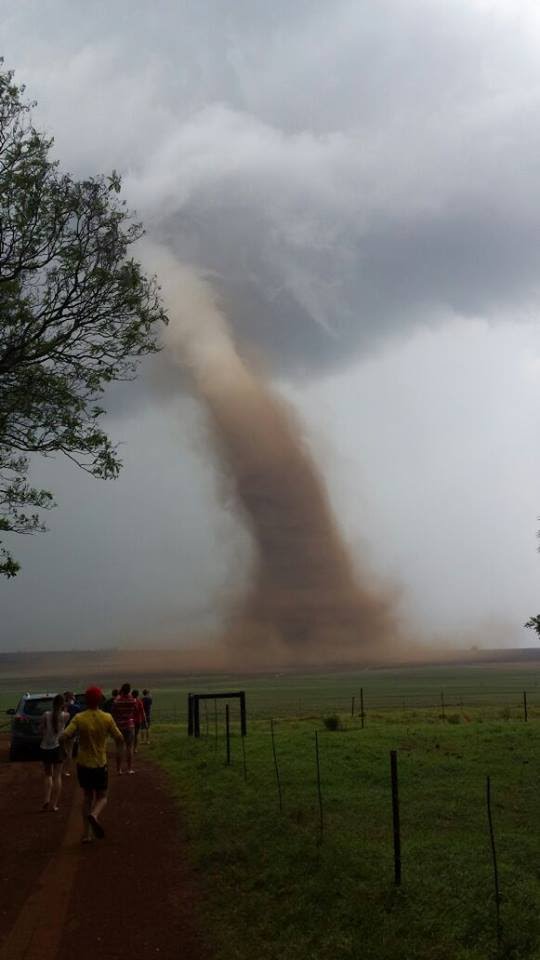
- Teacher: Winifred Jordaan
- Teacher: Lee-ann Simpson
- Teacher: Jannie Stander
- Teacher: Johan Stander
Meteorological basics for industry
- Teacher: Christina Liesker
- Teacher: Lithakazi Mkatshwa
- Teacher: Colleen Rae
- Teacher: Teke Ramotubei
- Teacher: Lee-ann Simpson
- Teacher: Jannie Stander
This is a course focusing on the continuous training needs of the SAWS weather forecasters. the course contains material dealing with NWP, Satellite, Forecasting and Radar training.
The course format includes online quizzes, tasks and discussion forums. All forecasters are welcome to partake in the course.
- Teacher: Winifred Jordaan
- Teacher: Lee-ann Simpson
- Teacher: Jannie Stander
- Teacher: Winifred Jordaan
- Teacher: Tshidi Mogale
- Teacher: Colleen Rae
- Teacher: Jannie Stander
- Teacher: Lee-ann Simpson
- Teacher: Jannie Stander
This is a collection of conceptual models created by operational forecasters within SAWS.
- Teacher: Thandiwe Gumede
- Teacher: Thapi Makgabutlane
- Teacher: Aslam Sardiwalla
- Teacher: Lee-ann Simpson
This course is aimed at testing your current satellite knowledge and being able to ask satellite meteorology-related questions. feel free to share interesting cases as well and help each other (and me) to learn.
- Teacher: Elani Heyneke
- Teacher: Kgolo Mahlangu
- Teacher: Lee-ann Simpson
- Teacher: Lauren Smith
A forum to discuss interesting features seen on satellite imagery
- Teacher: Vic Chapman
- Teacher: Bongani Chibi
- Teacher: Stacy Colborne
- Teacher: Nancy Dlamini
- Teacher: Wiseman Dlamini
- Teacher: Liesl Dyson
- Teacher: Carlton Fillis
- Teacher: Markus Geldenhuys
- Teacher: Morne Gijben
- Teacher: Phumla Goba
- Teacher: Henning Grobler
- Teacher: Thandiwe Gumede
- Teacher: Kevin Ingram
- Teacher: Quinton Jacobs
- Teacher: Xolile Jele
- Teacher: Jacques Jordaan
- Teacher: Winifred Jordaan
- Teacher: Jochen Kerkmann
- Teacher: Zakhele Khumalo
- Teacher: Sarah Kimani
- Teacher: Thembisile Kunene
- Teacher: Christina Liesker
- Teacher: Kgolo Mahlangu
- Teacher: Sisi Mahlangu
- Teacher: Thapi Makgabutlane
- Teacher: Mbavhi Maliage
- Teacher: Wisani Maluleke
- Teacher: Mandisa Manentsa
- Teacher: Lebogang Mashile
- Teacher: Sipho Mashwama
- Teacher: Luthando Masimini
- Teacher: Ernest Mbambalala
- Teacher: Lithakazi Mkatshwa
- Teacher: Puseletso Mofokeng
- Teacher: Phemelo Moloabi
- Teacher: Victorboy Motsa
- Teacher: William Msimanga
- Teacher: Oliver Mudenda
- Teacher: Michael Nethavhani
- Teacher: Ntobeko Nkangane
- Teacher: Chris Nkosi
- Teacher: Thabisile Phiwengomusa Ntleko
- Teacher: Kevin Rae
- Teacher: Teke Ramotubei
- Teacher: Jacky Riet
- Teacher: Tonie Rossouw
- Teacher: Aslam Sardiwalla
- Teacher: Ezekiel Sebego
- Teacher: Welheminah Seleka
- Teacher: Phepisa Sihlongonyane
- Teacher: Lee-ann Simpson
- Teacher: Dumisani Sithole
- Teacher: Rian Smit
- Teacher: Jacques Strydom
- Teacher: Dipuo Tawana
- Teacher: Maluta Tshifaro
- Teacher: Deon Van der Mescht
- Teacher: Luciane Veeck
- Teacher: Jan Vermeulen
- Teacher: Elizabeth Webster
- Teacher: Bodo Zeschke
- Teacher: Lee-ann Simpson
- Teacher: Jannie Stander
- Teacher: Anastasia Demertzis
- Teacher: Winifred Jordaan
- Teacher: Christina Liesker
- Teacher: Gugu Maphisa
- Teacher: Lithakazi Mkatshwa
- Teacher: Karin Oxley
- Teacher: Colleen Rae
- Teacher: Teke Ramotubei
- Teacher: Lee-ann Simpson
- Teacher: Jannie Stander
This is a Pre Assessment to identify possible knowledge gaps
- Teacher: Vic Chapman
- Teacher: Phumza Mbali
- Teacher: Lithakazi Mkatshwa
- Teacher: Thato Mothopi
- Teacher: Ntobeko Nkangane
- Teacher: Colleen Rae
- Teacher: Jannie Stander
- Teacher: Lee-ann Simpson
- Teacher: Jannie Stander
- Teacher: Elizabeth Webster
- Teacher: Stephanie Landman
- Teacher: Lee-ann Simpson
The course aims to provide training to operational forecasters on the interpretation of the Unified model output products
- Teacher: Winifred Jordaan
- Teacher: Stephanie Landman
- Teacher: Christina Liesker
- Teacher: Kevin Rae
- Teacher: Teke Ramotubei
- Teacher: Lee-ann Simpson
- Teacher: Jannie Stander
Weather SMART training for weather SMART presenters
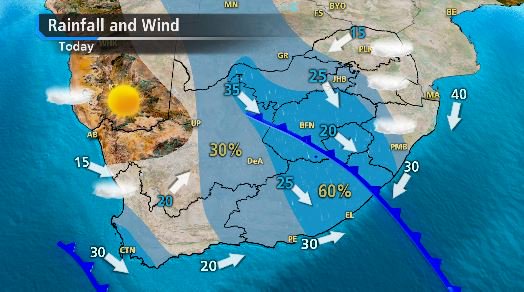
- Teacher: Lee-ann Simpson
- Teacher: Nhlanhla Sithole
It is the vision of the South African Weather Service to ensure 57 million WeatherSMART citizens. While being externally relevant is important, it is equally important that our staff are also WeatherSMART. For this reason, the RTC launched a “Weathersmart stuff for WeatherSMART staff” initiative.
This course consists of quarterly, morning training sessions.
The sessions will be covering basic meteorology, climatology, air quality and observations.
Each session will be followed by a questionnaire.

- Teacher: Gugu Maphisa
- Teacher: Colleen Rae
- Teacher: Teke Ramotubei
- Teacher: Lee-ann Simpson
- Teacher: Jannie Stander
- Teacher: Leo de Veer
- Teacher: Pieter Labuschagne
- Teacher: Tlalane Mathabathe
- Teacher: Lithakazi Mkatshwa
- Teacher: Colleen Rae
- Teacher: Enny Tsebe
- Teacher: Lithakazi Mkatshwa
- Teacher: Colleen Rae
- Teacher: Colleen Rae
- Teacher: Teke Ramotubei
- Teacher: Colleen Rae
- Teacher: Teke Ramotubei
- Teacher: Charlotte Mcbride
- Teacher: Lithakazi Mkatshwa
- Teacher: Colleen Rae
- Teacher: Teke Ramotubei
- Teacher: Phumza Mbali
- Teacher: Lithakazi Mkatshwa
- Teacher: Colleen Rae
- Teacher: Phumza Mbali
- Teacher: Lithakazi Mkatshwa
- Teacher: Colleen Rae
- Teacher: Colleen Rae
- Teacher: Teke Ramotubei
These notes show the similarities and differences in the coding of METARs and SPECIs with those of MET TEPORTS and SPECIAL report formats
- Teacher: Colleen Rae
- Teacher: Lithakazi Mkatshwa
- Teacher: Colleen Rae
- Teacher: Teke Ramotubei
- Teacher: Teke Ramotubei
- Teacher: Lithakazi Mkatshwa
- Teacher: Colleen Rae
- Teacher: Teke Ramotubei
This module explains the MetCap testing of sensors and the QC procedures
- Teacher: Colleen Rae
- Teacher: Lithakazi Mkatshwa
- Teacher: Colleen Rae
- Teacher: Teke Ramotubei
- Teacher: Lithakazi Mkatshwa
- Teacher: Teke Ramotubei
This is a short course on small portion (Tropical Cyclones) of Tropical Meteorology
- Teacher: Lithakazi Mkatshwa
- Teacher: Colleen Rae
- Teacher: Teke Ramotubei
The course content is based on the Information obtained from the new and updated WMO International Cloud Atlas
- Teacher: Colleen Rae
Upper air data and coded messages
- Teacher: Lithakazi Mkatshwa
- Teacher: Colleen Rae
- Teacher: Teke Ramotubei
- Teacher: Gugu Maphisa
- Teacher: Lithakazi Mkatshwa
- Teacher: Colleen Rae
This is a course for practice as a reviewer for WMO moodle course that is being developed.
- Teacher: Teke Ramotubei
WMO/ICAO Aeronautical Meteorological Observer (AMO) Competency Criteria
1. Monitor continuously the weather situation.
2. Observe and record aeronautical meteorological phenomena and parameters.
3. Ensure the quality of the performance of systems and of meteorological information.
4. Communicate meteorological information to internal and external users.
- Teacher: Phumza Mbali
- Teacher: Lithakazi Mkatshwa
- Teacher: Colleen Rae
Guidance in the compilation of PoEs to prove competency against specified ICAO competency criteria.
- Teacher: Phumza Mbali
- Teacher: Lithakazi Mkatshwa
- Teacher: Colleen Rae
This module looks at the general and scientific definitions of temperature as used in Meteorology. We also look at different instuments used to measure temperature along with their means of operation, how the temperature varies in one day as well as its impacts on atmospheric stability.
- Teacher: Lithakazi Mkatshwa
- Teacher: Colleen Rae
- Teacher: Teke Ramotubei
This should be read along with chapter three of explain basic meteorological concepts training manual for the National Certificate: Weather Observations. Any other material can also be used should there be a need for more knowledge not covered here and in the training manual. RTC trainers are also accessible for more explanation if necessary.
- Teacher: Lithakazi Mkatshwa
- Teacher: Colleen Rae
- Teacher: Teke Ramotubei
A basic refresher module on the interpretation of wind roses for use by Meteorological Technicians.
- Teacher: Lithakazi Mkatshwa
- Teacher: Lithakazi Mkatshwa
- Teacher: Colleen Rae
- Teacher: Teke Ramotubei
A brief online learning module on fog and mist
- Teacher: Lithakazi Mkatshwa
- Teacher: Colleen Rae
A refresher training course for Meteorological Technicians on the topic of: atmospheric moisture indicators
- Teacher: Lithakazi Mkatshwa
- Teacher: Colleen Rae
Interpretation of Tephigrams from an observation aspect
- Teacher: Lithakazi Mkatshwa
- Teacher: Colleen Rae
- Teacher: Samantha Linnerts
- Teacher: Dawn Mahlobo
- Teacher: Charlotte Mcbride
- Teacher: Lithakazi Mkatshwa
- Teacher: Colleen Rae
- Teacher: Teke Ramotubei
- Teacher: Lee-ann Simpson
This topic goes through the definition, formation, movement and weather impacts of a coastal low over the coast of South Africa.
- Teacher: Lithakazi Mkatshwa
- Teacher: Colleen Rae
- Teacher: Teke Ramotubei
Cut-Off Lows form part of the main rain bearing weather systems which bring moderate or heavy rainfall over South Africa.
- Teacher: Lithakazi Mkatshwa
- Teacher: Colleen Rae
- Teacher: Teke Ramotubei
This course is presented within the RTC Pretoria as part of the Post Graduate Certificate: Weather Forecasting
It has 2 components: A Theory component (5 days) and a practical component (6 months)
The 5 specific outcomes of the Aeronautical Meteorological Forecasters (AMF) course are:
1. Analyse and monitor continuously the weather situation.
2. Forecast aeronautical meteorological phenomena and parameters.
3. Warn of hazardous phenomena.
4. Ensure the quality of meteorological information and services.
5. Communicate meteorological information to internal and external users.

- Teacher: Jannie Stander
- Teacher: Elani Heyneke
- Teacher: Stephanie Landman
- Teacher: Samkelo Magwala
- Teacher: Elelwani Phaduli
- Teacher: Lee-ann Simpson
- Teacher: Jannie Stander
- Teacher: Helen Caughey
- Teacher: Brendan Kilshaw
- Teacher: Jannie Stander
This course is designed to empower those doing Aviation Forecasting
The course deals with important theory behind the Aviation Meteorological Forecaster Competencies of WMO. This theory lays the foundation for learning how to do the practical aviation meteorological forecast competencies
The course will help to understand:-
The underpinning aviation theory needed to perform the duty of an aviation weather forecaster.
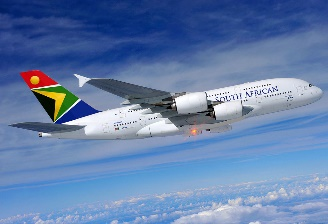
- Teacher: Jannie Stander
- Teacher: Christina Liesker
- Teacher: Lee-ann Simpson
- Teacher: Jannie Stander
This page contains notices, information and news that is specific to the forecasting certificate course.
- Teacher: Lee-ann Simpson
- Teacher: Jannie Stander
Complete a forecasting based research project
- Teacher: Tshidi Mogale
- Teacher: Lee-ann Simpson
- Teacher: Jannie Stander
This is in-house training on the FFG
- Teacher: Rochelle Graham
- Teacher: Cynthia Nemutudi
- Teacher: Vanetia Phakula
- Teacher: Jannie Stander
- Teacher: Edward Engelbrecht
- Teacher: Elani Heyneke
- Teacher: Stephanie Landman
- Teacher: Samkelo Magwala
- Teacher: Matshidiso Mogale
- Teacher: Tshidi Mogale
- Teacher: Elelwani Phaduli
- Teacher: Teke Ramotubei
- Teacher: Lee-ann Simpson
- Teacher: Jannie Stander
|
The competence requirements for MWF are divided under the following categories
|
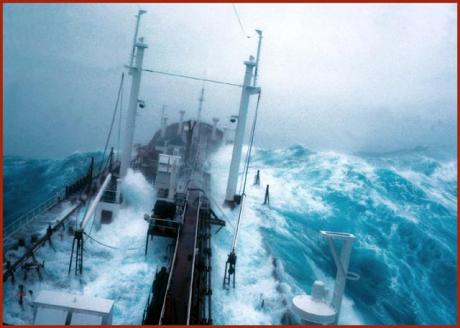
- Teacher: Petro Burger
- Teacher: Marc De Vos
- Teacher: Kgolo Mahlangu
- Teacher: Mbavhi Maliage
- Teacher: Lithakazi Mkatshwa
- Teacher: Tshidi Mogale
- Teacher: Vanetia Phakula
- Teacher: Christo Rautenbach
- Teacher: Lee-ann Simpson
- Teacher: Jannie Stander
- Teacher: Wayne Venter
- Teacher: Elizabeth Webster
- Teacher: Tania Williams
- Teacher: Lee-ann Simpson
- Teacher: Jannie Stander
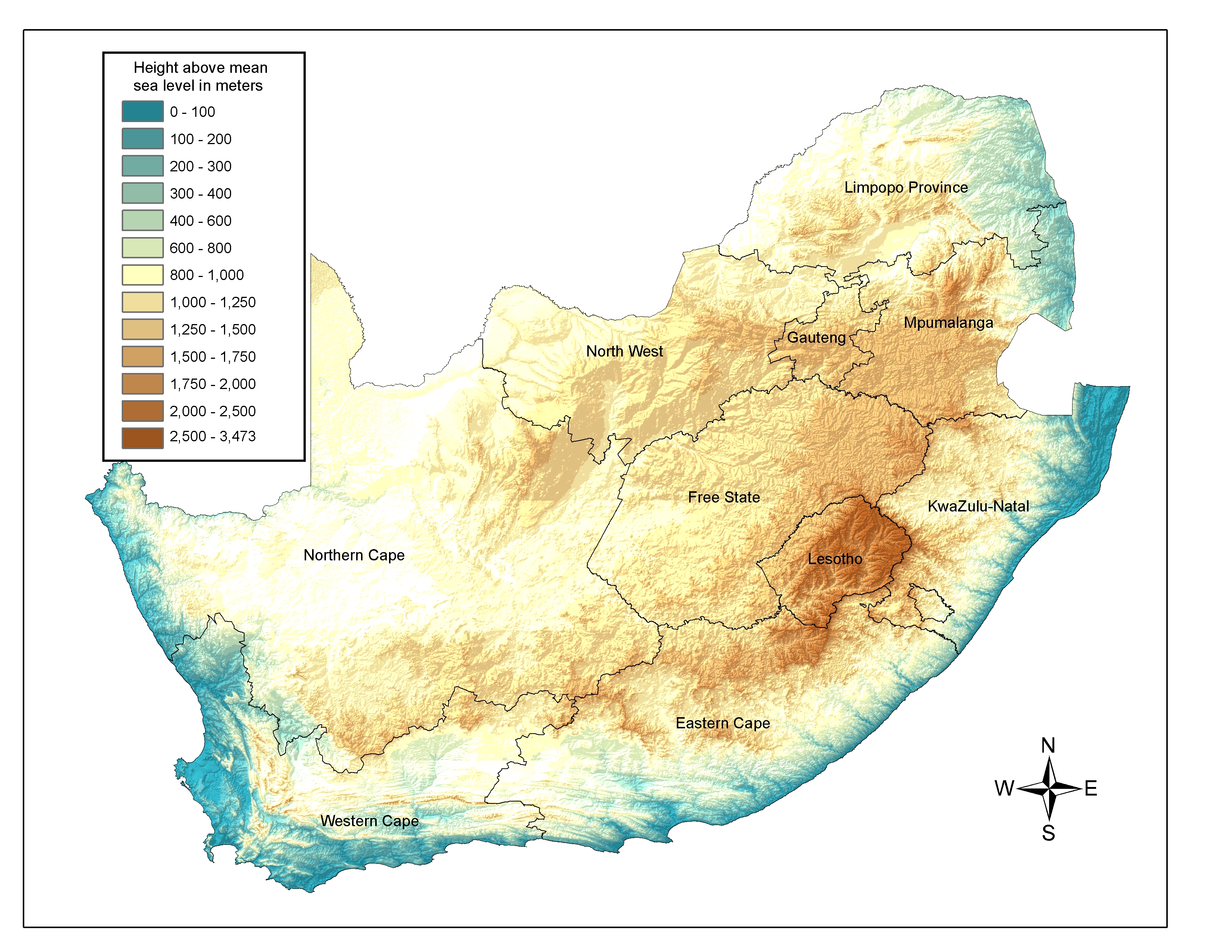
- Teacher: Colleen Rae
- Teacher: Lee-ann Simpson
- Teacher: Jannie Stander
Interpret upper air ascent data (Tephi and Skew T)
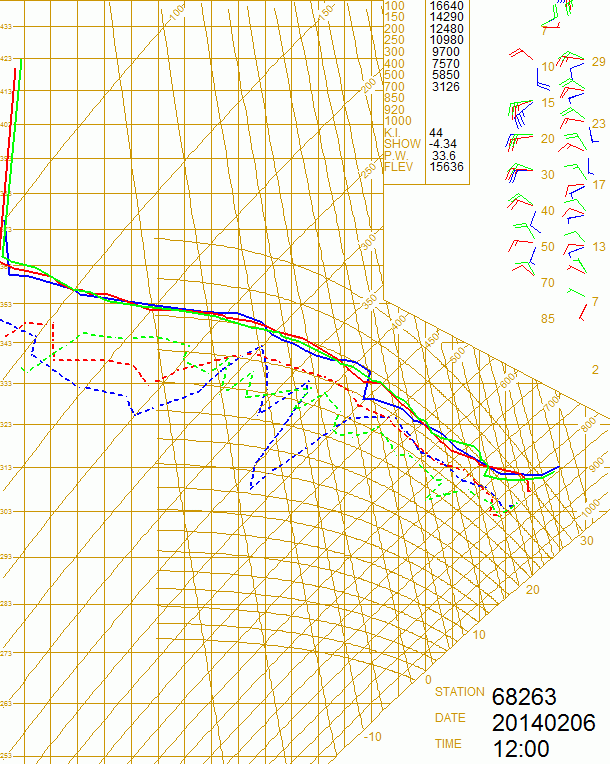
- Teacher: Colleen Rae
- Teacher: Lee-ann Simpson
- Teacher: Jannie Stander
Decode and interpret surface observational weather data and integrate data with knowledge on Climate, Geography and topography of South Africa
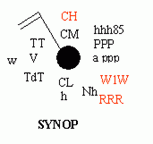
- Teacher: Colleen Rae
- Teacher: Teke Ramotubei
- Teacher: Lee-ann Simpson
- Teacher: Jannie Stander
remote sensing for the Forecasting certificate students.
- Teacher: Morne Gijben
- Teacher: Elani Heyneke
- Teacher: Kgolo Mahlangu
- Teacher: Bathobile Maseko
- Teacher: Lee-ann Simpson
- Teacher: Lauren Smith
- Teacher: Jannie Stander
- Teacher: Elani Heyneke
- Teacher: Vanetia Phakula
- Teacher: Lee-ann Simpson
- Teacher: Jannie Stander
- Teacher: Elizabeth Webster
- Teacher: Jannie Stander
- Teacher: Samkelo Magwala
- Teacher: Odirile Modipa
- Teacher: Tshidi Mogale
- Teacher: Cynthia Nemutudi
- Teacher: Colleen Rae
- Teacher: Nhlanhla Sithole
- Teacher: Jannie Stander
- Teacher: Samkelo Magwala
- Teacher: Odirile Modipa
- Teacher: Tshidi Mogale
- Teacher: Cynthia Nemutudi
- Teacher: Colleen Rae
- Teacher: Nhlanhla Sithole
- Teacher: Jannie Stander
- Teacher: Samkelo Magwala
- Teacher: Tshidi Mogale
- Teacher: Cynthia Nemutudi
- Teacher: Colleen Rae
- Teacher: Nhlanhla Sithole
- Teacher: Jannie Stander
- Teacher: Elani Heyneke
- Teacher: Elelwani Phaduli
- Teacher: Jannie Stander
- Teacher: Elani Heyneke
- Teacher: Stephanie Landman
- Teacher: Samkelo Magwala
- Teacher: Tshidi Mogale
- Teacher: Cynthia Nemutudi
- Teacher: Elelwani Phaduli
- Teacher: Colleen Rae
- Teacher: Gift Rambuwani
- Teacher: Nhlanhla Sithole
- Teacher: Jannie Stander
- Teacher: Samkelo Magwala
- Teacher: Lithakazi Mkatshwa
- Teacher: Odirile Modipa
- Teacher: Tshidi Mogale
- Teacher: Cynthia Nemutudi
- Teacher: Colleen Rae
- Teacher: Nhlanhla Sithole
- Teacher: Jannie Stander
- Teacher: Morne Gijben
- Teacher: Samkelo Magwala
- Teacher: Bathobile Maseko
- Teacher: Odirile Modipa
- Teacher: Tshidi Mogale
- Teacher: Cynthia Nemutudi
- Teacher: Colleen Rae
- Teacher: Nhlanhla Sithole
- Teacher: Jannie Stander
- Teacher: Tshidi Mogale
- Teacher: Cynthia Nemutudi
- Teacher: Colleen Rae
- Teacher: Jannie Stander
Integrating and interpretation of all observational and remotely sensed data
- Teacher: Samkelo Magwala
- Teacher: Odirile Modipa
- Teacher: Tshidi Mogale
- Teacher: Cynthia Nemutudi
- Teacher: Colleen Rae
- Teacher: Nhlanhla Sithole
- Teacher: Jannie Stander
Aviation Meteorological Forecaster (AMF) Blended Learning Course (4 months online) (1 month contact)
This course targets a primary audience of Meteorologists who would like to become competent Aviation Meteorological Forecasters (AMF).
The course has 2 phases: A distance learning phase (4 months) and a classroom phase (1 month) where the practical competency for AMF is developed by forecasting and warning against hazardous weather phenomena using hazardous weather simulations.
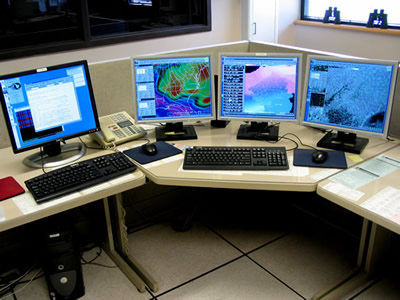
- Teacher: Winifred Jordaan
- Teacher: Jannie Stander
This course will focus on the Meteosat Second Generation (MSG) Satellite and its products. This satellite provides South Africa with the best Geo-Stationary satellite imagery available. The MSG system is established under cooperation between EUMETSAT and the European Space Agency (ESA), to ensure the continuity of meteorological observations from geostationary orbit. Software and data for the course will be obtained directly from Eumetsat. The following concepts will be covered in the course: • Basics of remote Sensing • Introduction to all 12 Channels of the MSG satellite • Introduction to Channel difference and Brightness Temperature Differences (BTD) • Introduction to channel combinations (RGB) • Basic cloud type identification • Accessing Data • Introduction to data manipulation using appropriate software
- Teacher: Lee-ann Simpson
- Teacher: Jannie Stander
- Teacher: Petro Burger
- Teacher: Lithakazi Mkatshwa
- Teacher: Nhlanhla Sithole
- Teacher: Tshidi Mogale
- Teacher: Cynthia Nemutudi
- Teacher: Jannie Stander
- Teacher: Jannie Stander
- Teacher: Samkelo Magwala
- Teacher: Colleen Rae
- Teacher: Jannie Stander
This is the commercial AMF course for SADC delivered to:
Mozambique participants: Oct 2018
Lesotho participants: Oct/Nov 2019
Namibia participants: Oct 2019

- Teacher: Lee-ann Simpson
- Teacher: Jannie Stander
This course will focus on the basics of weather systems and terminology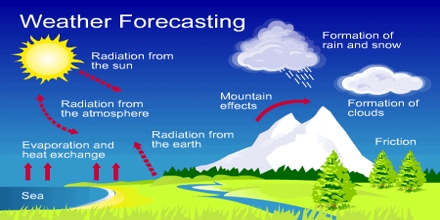
- Teacher: Michelle Hartslief
- Teacher: Winifred Jordaan
- Teacher: Christina Liesker
- Teacher: Gugu Maphisa
- Teacher: Lithakazi Mkatshwa
- Teacher: Colleen Rae
- Teacher: Teke Ramotubei
- Teacher: Lee-ann Simpson
- Teacher: Jannie Stander
- Teacher: Lithakazi Mkatshwa
- Teacher: Teke Ramotubei
Learning resources for the meteorological training of members of the South African National Antarctic Expedition, Meteorological Teams
- Teacher: Lithakazi Mkatshwa

- Teacher: Lithakazi Mkatshwa
- Teacher: Peter Roux
Meteorological training for the Marion Island Expedition's overwintering team meteorologists.
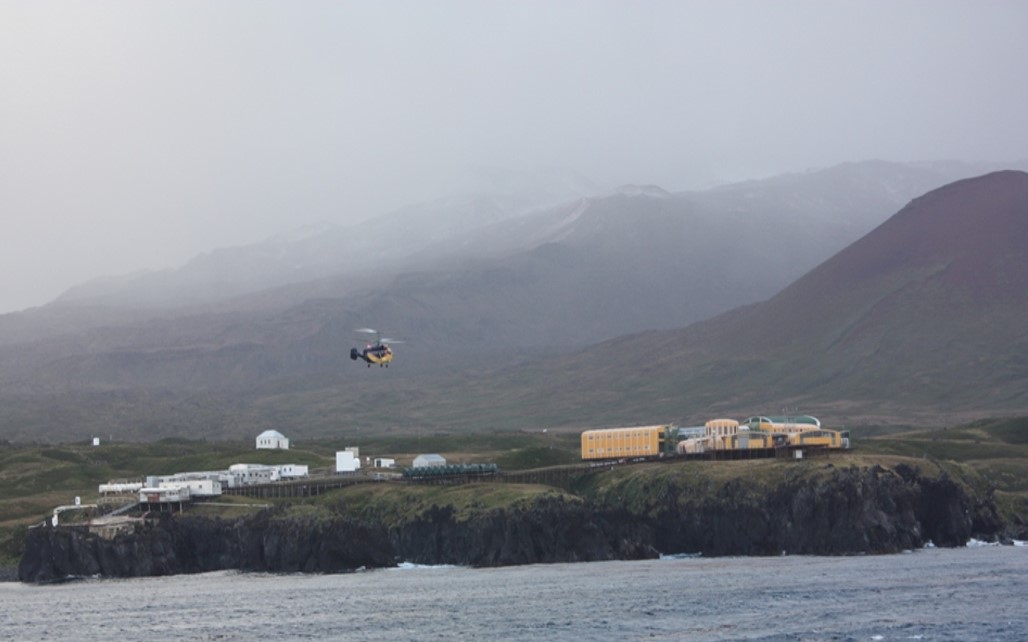
- Teacher: Mardene de Villiers
- Teacher: Lithakazi Mkatshwa
- Teacher: Peter Roux
- Teacher: Tshidi Mogale
- Teacher: Jannie Stander
- Teacher: Cynthia Nemutudi
- Teacher: Colleen Rae
- Teacher: Nhlanhla Sithole
- Teacher: Jannie Stander
This is a training needs Survey for the 2022 WMO forecasting course
- Teacher: Tshidi Mogale
- Teacher: Colleen Rae
- Teacher: Jannie Stander
This survey is aimed at gathering data on the operational use of the FFG products in the SAWS forecasting offices.
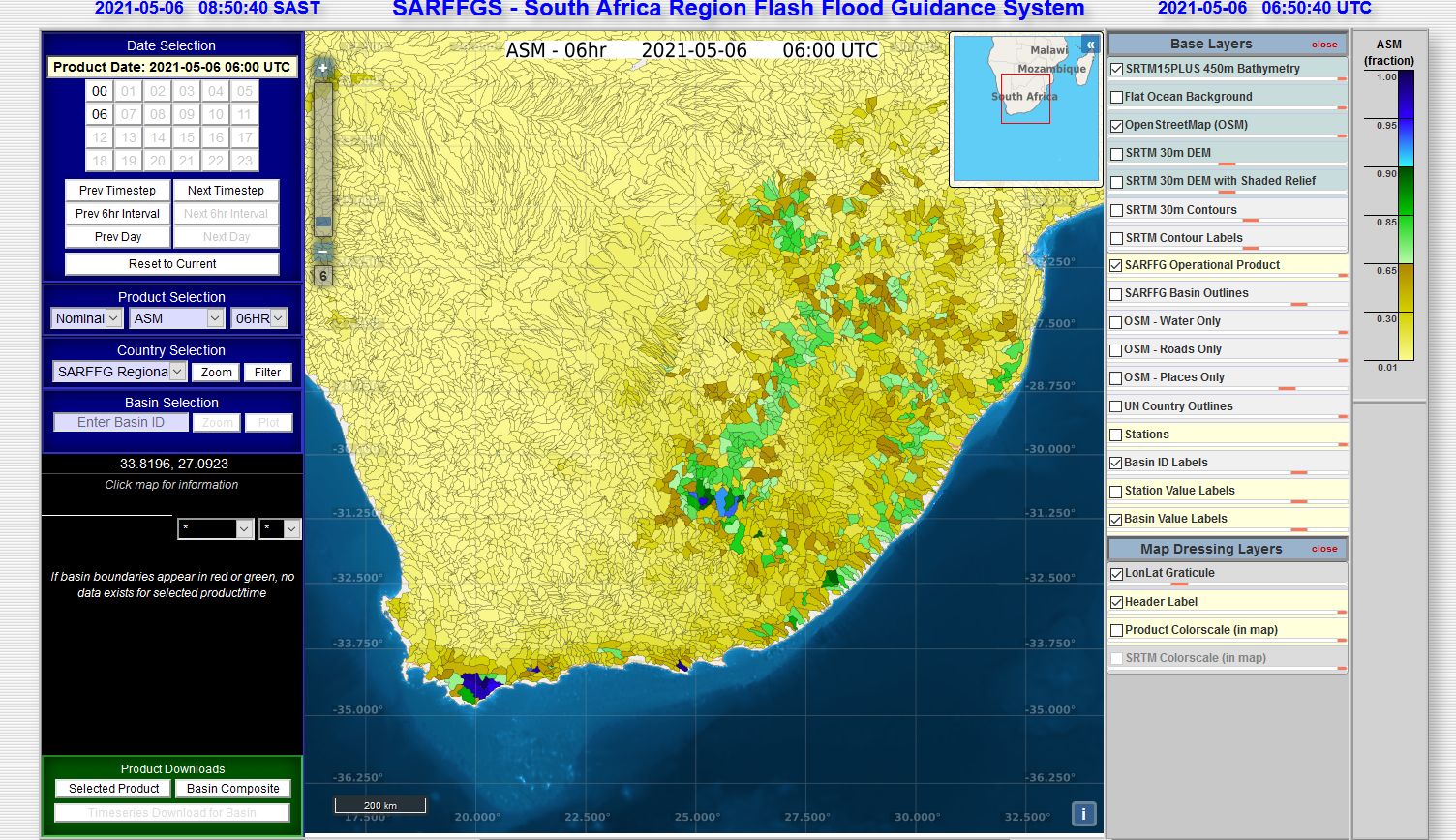
- Teacher: Vanetia Phakula
- Teacher: Ezekiel Sebego
- Teacher: Lee-ann Simpson
- Teacher: Jannie Stander
- Teacher: Dipuo Tawana
A needs analysis survey to determine training needs for Public Weather Forecasters
- Teacher: Cynthia Nemutudi
- Teacher: Colleen Rae
- Teacher: Lee-ann Simpson
- Teacher: Nhlanhla Sithole
- Teacher: Jannie Stander
- Teacher: Christina Liesker
- Teacher: Jannie Stander
This is a survey to establish the regional forecasting training needs in the SADC region
- Teacher: Christina Liesker
- Teacher: Lee-ann Simpson
- Teacher: Jannie Stander
A needs analysis survey to determine training needs for Aviation Weather Forecasters
- Teacher: Jannie Stander
This is a survey to determine stake holder satisfaction of the 2018 forecaster intake into operations 6 months after they were appointed
- Teacher: Jannie Stander
This is a survey for the supervisors of the newly employed forecasters
- Teacher: Jannie Stander
This survey is intended to plan the re-fresher training of the forecasters in Cape Town as the prepare to take on the marine operations in 2019.
- Teacher: Christina Liesker
This is a survey for the supervisors of the newly employed forecasters
- Teacher: Winifred Jordaan
- Teacher: Christina Liesker
- Teacher: Lee-ann Simpson
- Teacher: Jannie Stander
This is a survey to determine stake holder satisfaction of the 2017 forecaster intake into operations 6 months after they were appointed
- Teacher: Winifred Jordaan
- Teacher: Christina Liesker
- Teacher: Lee-ann Simpson
- Teacher: Jannie Stander
This is a survey to establish the regional forecasting training needs in the SADC region
- Teacher: Christina Liesker
- Teacher: Lee-ann Simpson
- Teacher: Jannie Stander
- Teacher: Mandlesilo Mavimbela
- Teacher: Dithuso Mogapi
- Teacher: Colleen Rae
This course provides a brief introduction to the concepts of Total Quality Management
- Teacher: Winifred Jordaan
- Teacher: Mandlesilo Mavimbela
- Teacher: Lithakazi Mkatshwa
- Teacher: Dithuso Mogapi
- Teacher: Colleen Rae
- Teacher: Lee-ann Simpson
- Teacher: Jannie Stander
- Teacher: Cynthia Nemutudi
- Teacher: Florrie Sithole
- Teacher: Jannie Stander
- Teacher: Jannie Stander
- Teacher: Tshidi Mogale
- Teacher: Cynthia Nemutudi
- Teacher: Nhlanhla Sithole
- Teacher: Jannie Stander
- Teacher: Tshidi Mogale
- Teacher: Cynthia Nemutudi
- Teacher: Nhlanhla Sithole
- Teacher: Jannie Stander
- Teacher: Tshidi Mogale
- Teacher: Cynthia Nemutudi
- Teacher: Nhlanhla Sithole
- Teacher: Jannie Stander
- Teacher: Tshidi Mogale
- Teacher: Cynthia Nemutudi
- Teacher: Elelwani Phaduli
- Teacher: Gift Rambuwani
- Teacher: Nhlanhla Sithole
- Teacher: Jannie Stander
- Teacher: Tshidi Mogale
- Teacher: Cynthia Nemutudi
- Teacher: Nhlanhla Sithole
- Teacher: Jannie Stander
- Teacher: Tshidi Mogale
- Teacher: Cynthia Nemutudi
- Teacher: Nhlanhla Sithole
- Teacher: Jannie Stander
- Teacher: Tshidi Mogale
- Teacher: Cynthia Nemutudi
- Teacher: Nhlanhla Sithole
- Teacher: Jannie Stander
- Teacher: Morne Gijben
- Teacher: Tshidi Mogale
- Teacher: Cynthia Nemutudi
- Teacher: Nhlanhla Sithole
- Teacher: Jannie Stander
- Teacher: Stephanie Landman
- Teacher: Tshidi Mogale
- Teacher: Cynthia Nemutudi
- Teacher: Jannie Stander
- Teacher: Matshidiso Mogale
- Teacher: Tshidi Mogale
- Teacher: Cynthia Nemutudi
- Teacher: Nhlanhla Sithole
- Teacher: Jannie Stander
- Teacher: Tshidi Mogale
- Teacher: Cynthia Nemutudi
- Teacher: Nhlanhla Sithole
- Teacher: Jannie Stander
Skip course categories
